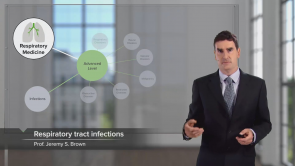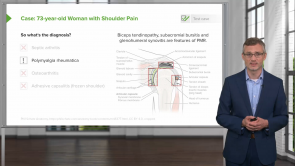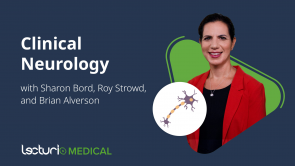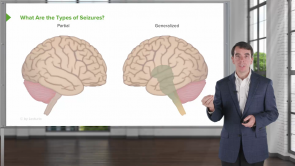Seizures: Mechanisms

Über den Vortrag
Der Vortrag „Seizures: Mechanisms“ von Roy Strowd, MD ist Bestandteil des Kurses „Year 2 – Neurology-Psychiatry“.
Quiz zum Vortrag
Which term is used to describe the beginning step with respect to initiation of a seizure?
- Paroxysmal depolarization shift
- Transition to ictus
- Increased inhibitory tone
- Neuronal synchronization
- Decreased glutamate secretion
Which statement is the most accurate when discussing the first step of seizure initiation?
- Seizures arise from neuronal cell bodies located in the gray matter of the brain.
- Astrocytes surrounding the neurons become deactivated.
- Decreased calcium-channel signaling causes a decrease in neuronal excitement.
- The initial depolarization event can only occur deep within the brain.
- The electroencephalogram will show a slow wave followed by a spike.
Which sentence is the most accurate with respect to neuron synchronization?
- Partial depolarization of a neuron occurs when a large group of surrounding neurons is repeatedly activated.
- Repeated depolarization of neurons can decrease extracellular potassium.
- Excitation threshold is increased, making depolarization more difficult.
- Antiepileptic drugs target the neuron synchronization step.
- Calcium-channel signaling decreases during the neuron synchronization step.
Which statement is the most accurate with respect to neuron inhibition during seizure propagation?
- Antiepileptic drugs act by increasing the neuron inhibition pathways.
- Increased calcium signaling has no long-term effects on neurons after the levels are normalized.
- Glutamate scavenging is increased during seizure propagation.
- Repeated activation of neurons in the hippocampus results in improved inhibitory capacity.
- Having a seizure does not increase the chance of a subsequent attack.
Diese Kurse könnten Sie interessieren
Kundenrezensionen
5,0 von 5 Sternen
| 5 Sterne |
|
1 |
| 4 Sterne |
|
0 |
| 3 Sterne |
|
0 |
| 2 Sterne |
|
0 |
| 1 Stern |
|
0 |
This lecture is neat and well explained, and not least exciting.







